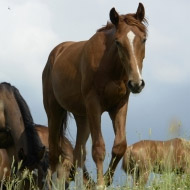
Horse owners advised to take precautions
A fatal case of Hendra virus has been confirmed in North Queensland, Australia. It is the first case so far this year, according to the Department of Agriculture and Fisheries.
Queensland's chief veterinary officer, Dr Allison Crook, said a property on the Atherton Tablelands has been quarantined after a horse died on the site last week.
"Testing has confirmed the horse had the virus..." Dr Crook said. "There are a number of other horses on the property and we'll be monitoring them over the coming weeks. Biosecurity staff will also be conducting tracing to confirm whether this horse had any contact with other horses in the area.
"While the property is under quarantine, there are restrictions on the movement of horses and materials on and off the property."
Hendra is an emerging disease that has only been found in Australia. Around 70 per cent of horses to test positive for the virus have died from it, while those that have recovered have been euthanised, according to the Australian Veterinary Association. Humans can become infected through contact with affected horses.
Following the recent case, horse owners have been urged to take steps to protect their animals.
"Vaccination is the best defence against Hendra virus infection and horse owners should discuss their options with their veterinarian," Dr Crook said.
Should horses become unwell, their keepers are advised to contact their veterinary surgeon immediately.
"People in contact with horses need to remember to continue to practice good biosecurity and personal hygiene measures even if a horse is vaccinated against Hendra virus," Dr Crook added.
For further information about Hendra virus, visit: https://www.daf.qld.gov.au/animal-industries/animal-health-and-diseases/a-z-list/hendra-virus



 The Animal and Plant Health Agency (APHA) has updated its online reporting service for dead wild birds.
The Animal and Plant Health Agency (APHA) has updated its online reporting service for dead wild birds.